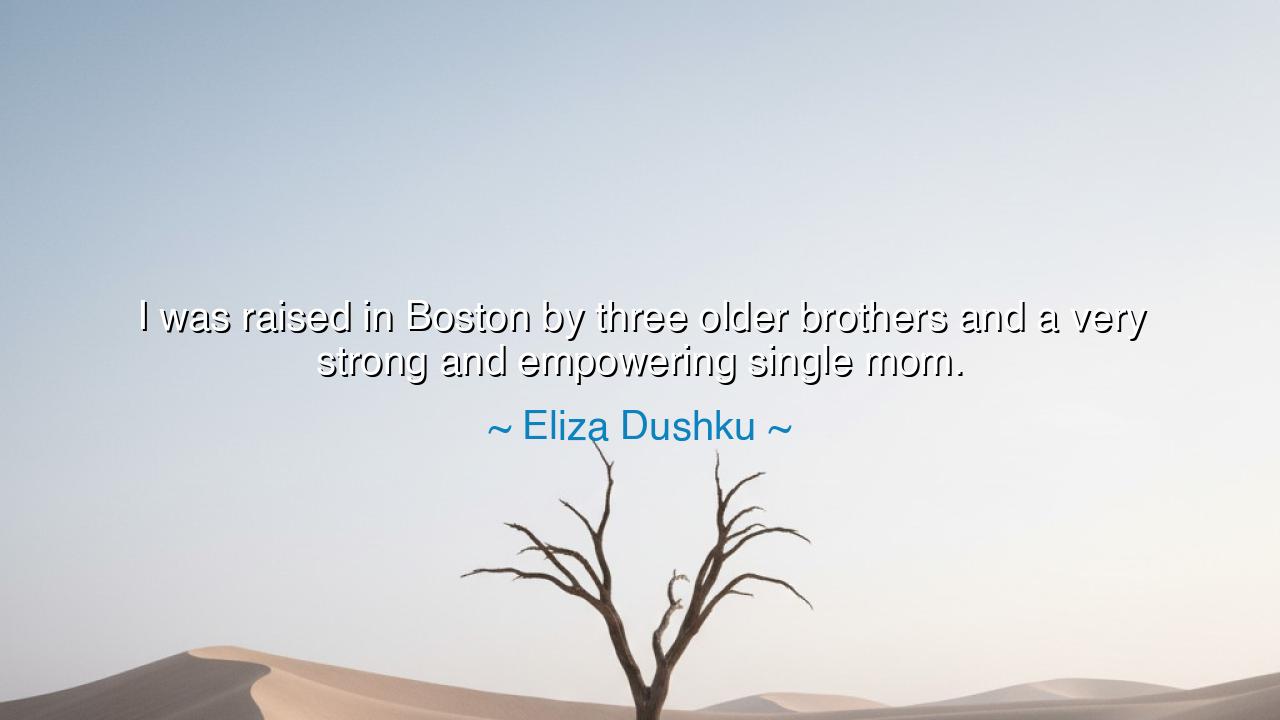
I was raised in Boston by three older brothers and a very strong
I was raised in Boston by three older brothers and a very strong and empowering single mom.






“I was raised in Boston by three older brothers and a very strong and empowering single mom.” — Eliza Dushku
In these simple, resolute words, Eliza Dushku offers a portrait of strength born not from privilege, but from endurance — from the fire that shapes a soul in the crucible of family, struggle, and love. Her statement, though brief, carries the weight of a life formed by resilience, feminine power, and the unyielding bonds of kinship. She speaks of Boston, a city known for its iron backbone and fighting spirit — a place that mirrors her upbringing. Yet at the heart of her story stands not the city, nor her brothers, but the pillar of it all: her single mother, both strong and empowering, who carried her family through storm and season, teaching not only survival but strength of spirit.
To say “I was raised” is to speak of inheritance — not of wealth, but of character. The ancients believed that true inheritance was not gold, but virtue, passed from parent to child like sacred fire. In Dushku’s words, we hear that fire flickering, kept alive by a mother who refused to be extinguished. A single mother in any age stands as both warrior and nurturer, her dual strength unmatched: one hand shielding her children from the world’s coldness, the other building them into something greater. This image echoes the timeless figure of Demeter, the goddess who labored alone when her daughter Persephone was lost, her love fierce enough to change the seasons themselves. Dushku’s mother, like Demeter, is the embodiment of that same divine resolve — a woman who raised her children not through ease, but through courage.
And then there are the three older brothers, the guardians and challengers, the rough winds that sharpened her resolve. Among them, Dushku would have learned to stand her ground, to speak boldly, to meet strength with strength. The ancients would have seen this as the training of the spirit — the way of the young hero learning courage through trial. For even the gentle must learn to be fierce. Like Atalanta, the swift huntress raised among men and beasts, Dushku’s youth among brothers taught her resilience and independence, gifts that would later shape her presence both on screen and in life.
Yet behind all of this stands the mother’s influence, described not only as strong but empowering — a word that transforms strength into something luminous and outward-reaching. To empower is to kindle fire in others, to lift not only oneself but all who walk beside you. Her mother’s strength did not harden into bitterness; it became a source of creation, the wellspring from which Eliza’s courage, empathy, and individuality flowed. The ancients would call this the power of the matriarch, the sacred balance between authority and love, command and compassion.
We are reminded, too, of the great story of Queen Olympias, mother of Alexander the Great. When others saw a boy, she saw a conqueror. She whispered into his heart the belief that he was destined for greatness. It was her unwavering conviction, not just his ambition, that shaped his destiny. So too, Dushku’s mother, standing alone, must have whispered strength into her children’s bones — the same strength that allows Eliza to speak now, not in sorrow, but in pride. For to honor one’s parent in such words is itself an act of reverence, a recognition that one’s roots are sacred.
There is, in Dushku’s quote, a quiet defiance of the world’s narrow expectations. Society often measures families by their structure, yet here she declares that love, not form, defines home. In her mother’s story lies a truth older than law or tradition: that the single parent, though alone, carries the might of both sun and moon. The ancients would have seen in such a woman a living symbol of balance — the union of masculine endurance and feminine grace. The brothers gave her strength; the mother gave her spirit. And from both, Dushku inherited the courage to create her own path.
The lesson to those who listen is this: Do not measure your beginnings by what you lacked, but by what you were given that cannot be taken — love, resilience, and the will to rise. Those who grow in hardship are like trees that root deep into rock; their foundation is unshakable. If you were raised by one parent, or among chaos, or in challenge, take heart — for you have inherited not weakness but wisdom. And if you are the one raising others, remember: every act of love, every sleepless night, every moment of courage sows strength into the generations that follow.
So let this truth pass down as the ancients would tell it: the strongest homes are not built of stone, but of spirit. The most powerful legacies are not written in titles, but in the lives they shape. And from every mother who stands alone — every child who learns to rise — the world is remade anew.






AAdministratorAdministrator
Welcome, honored guests. Please leave a comment, we will respond soon